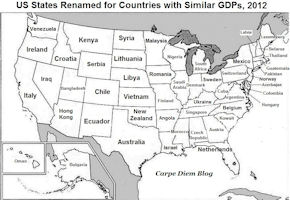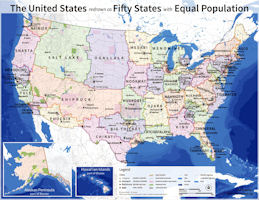State Government
The Tenth Amendment set definite limits on congressional authority, by providing that powers not delegated to the national government are reserved to the states or to the people. The federal entity created by the Constitution is the dominant feature of the American governmental system. But the system itself is in reality a mosaic, composed of thousands of smaller units—building blocks that together make up the whole. There are 50 state governments plus the government of the District of Columbia, and further down the ladder are still smaller units that govern counties, cities, towns, and villages.
This multiplicity of governmental units is best understood in terms of the evolution of the United States. The federal system, it has been seen, was the last step in an evolutionary process. Prior to the Constitution, there were the governments of the separate colonies (later states) and, prior to those, the governments of counties and smaller units. One of the first tasks accomplished by the early English settlers was the creation of governmental units for the tiny settlements they established along the Atlantic coast. Even before the Pilgrims disembarked from their ship in 1620, they formulated the Mayflower Compact, the first written American constitution. And as the new nation pushed westward, each frontier outpost created its own government to manage its affairs.
The drafters of the U.S. Constitution left this multilayered governmental system untouched. While they made the national structure supreme, they wisely recognized the need for a series of governments more directly in contact with the people and more keenly attuned to their needs. Thus, certain functions—such as defense, currency regulation, and foreign relations—could only be managed by a strong centralized government. But others—such as sanitation, education, and local transportation—could be better served by local jurisdictions.
Before their independence, colonies were governed separately by the British Crown. In the early years of the republic, prior to the adoption of the Constitution, each state was virtually an autonomous unit. The delegates to the Constitutional Convention sought a stronger, more viable federal union, but they were also intent on safeguarding the rights of the states.
In general, matters that lie entirely within state borders are the exclusive concern of state governments. These include internal communications; regulations relating to property, industry, business, and public utilities; the state criminal code; and working conditions within the state. Within this context, the federal government requires that state governments must be democratic in form and that they adopt no laws that contradict or violate the federal Constitution or the laws and treaties of the United States.
There are, of course, many areas of overlap between state and federal jurisdictions. Particularly in recent years, the federal government has assumed ever broadening responsibility in such matters as health, education, welfare, transportation, and housing and urban development. But where the federal government exercises such responsibility in the states, programs are usually adopted on the basis of cooperation between the two levels of government, rather than as an imposition from above.
Like the national government, state governments have three branches: executive, legislative, and judicial; these are roughly equivalent in function and scope to their national counterparts. The chief executive of a state is the governor, elected by popular vote, typically for a four-year term (although in a few states the term is two years). Except for Nebraska, which has a single legislative body, all states have a bicameral legislature, with the upper house usually called the Senate and the lower house called the House of Representatives, the House of Delegates, or the General Assembly. In most states, senators serve four-year terms, and members of the lower house serve two-year terms.
The constitutions of the various states differ in some details but generally follow a pattern similar to that of the federal Constitution, including a statement of the rights of the people and a plan for organizing the government. On such matters as the operation of businesses, banks, public utilities, and charitable institutions, state constitutions are often more detailed and explicit than the federal one. Each state constitution, however, provides that the final authority belongs to the people, and sets certain standards and principles as the foundation of government.
US House lawmakers made history 26 June 2020 by voting for Washington to become the nation's 51st state, but the move, a push for equal voting rights for the capital's residents, is doomed in the Senate. More than 705,000 Americans live in the District of Columbia, a Democratic stronghold with a population greater than two states, Wyoming and Vermont, and comparable to two others. Democratic lawmakers framed the DC statehood bill as an overdue remedy to disenfranchisement perpetuated since Congress made Washington the nation's permanent capital in 1790, and a longstanding civil rights issue for a city that's nearly 50 percent black.
The statehood vote is the first in Congress since 1993. Never has such a bill – appropriately titled HR-51 – cleared the House or Senate. "Congress has two choices: it can continue to exercise undemocratic autocratic authority over" Washington, "or Congress can live up to this nation's promise and ideals and pass HR51," said Washington's House delegate Eleanor Holmes Norton, who does not have floor vote privileges and therefore was unable to cast a vote for DC statehood.
Under the Democratic proposal, a small federal district would remain, encompassing government buildings, Congress, monuments, the National Mall area and the White House. The new state would be known as Washington, Douglass Commonwealth, taking the names of the nation's first president George Washington and prominent black abolitionist Frederick Douglass.
|
NEWSLETTER
|
| Join the GlobalSecurity.org mailing list |
|
|
|




